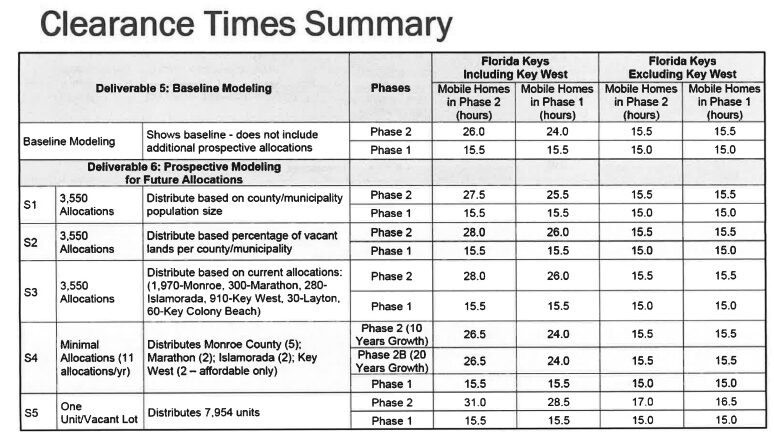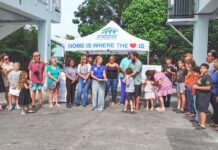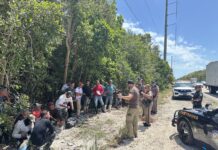As Monroe County and its municipalities continue to grapple with the impending reality of expiring Rate of Growth Ordinance (ROGO)/Building Permit Allocation System (BPAS) units, a tentative agreement broached by Marathon and county officials on Monday night is expected to provide a two-year Band-Aid for Marathon’s remaining building allocations, originally set to expire this summer.
Though the Jan. 22 meeting was simply a workshop for Marathon and the city council could take no official action, Monroe County Administrator Roman Gastesi and County Attorney Bob Shillinger, together with the council, outlined the basic premise of a deal that would loan building allocations from Monroe County to Marathon, theoretically extending the timeline for Marathon’s allocations – originally set to expire in July 2024 – to run out in conjunction with the county’s in 2026. Though not specifically discussed, the implication in the room was that Marathon, in turn, would not pursue additional units during the 2024 state legislative session.
County commissioners Craig Cates and David Rice as well as Vice Mayor Jim Scholl attended the meeting in person, with Mayor Holly Raschein watching virtually.
The move comes less than two weeks after Marathon City Manager George Garrett sent draft legislation to state Rep. Jim Mooney, Gastesi and Bob Shillinger on Jan. 11 that could modify mandatory hurricane evacuation clearance times throughout the Florida Keys Area of Critical State Concern (ACSC) and provide up to 8,000 new building allocations for distribution along the island chain.
Intending to protect the city from the financial liability of “takings” cases should owners of vacant, but otherwise buildable, lots find it impossible to secure a permit to build on their property, the majority of the Marathon council members said they viewed Garrett’s draft legislation as a natural extension of direction given to him by the council in December.
Two days before Garrett sent the draft, the council approved Resolution 2024-01, which supported changes to the treatment of Key West residents and mobile homes in evacuation models, as well as a general “Legislative solution to the continuation of BPAS (ROGO) and the cessation of the ‘takings’ dilemma.”

Although Garrett and Marathon City Attorney Steve Williams addressed Marathon’s pressing need at the county’s Dec. 13 commission meeting, the draft legislation elicited a swift response from area residents, the draft’s recipients and county commissioners, who said they weren’t fully aware of how quickly or aggressively Marathon may pursue additional units – theoretically, as early as the 2024 legislative session.
As estimated by staff, Marathon has 1,026 vacant lots, including 556 buildable parcels and 215 waterfront properties. The city currently holds applications for 81 market rate and affordable allocations, 48 of which could theoretically request to pull from the city’s 12 remaining Administrative Relief allocations.
Though county officials said they are still in the process of determining the number of buildable lots within the county’s jurisdiction, Monroe has roughly 300 market rate allocations remaining – about half of which are in its administrative relief pool – and fewer than 10 affordable units. Three hundred early evacuation affordable units bestowed on the county by then-Gov. Rick Scott in 2018 are not currently available for development, but could become available for administrative relief at a future date, county spokeswoman Kristen Livengood told the Weekly.
Garrett clarified in the meeting’s agenda packet that as the majority of the Keys are governed by the same set of statutes as a single ACSC, asking the state for allocations for use in Marathon alone was not an option, and that even if the allocations were handed down, other municipalities would have the choice of whether or not to accept them.
Councilman Luis Gonzalez first put forth the idea for the loan at the start of Tuesday’s meeting, asking for up to 50 allocations from the county with a mixture of market rate and affordable units. With Marathon’s current rate of allocation distribution – a total of five units every six months – the extension from 2024 to 2026 would theoretically require a loan of at least 20 units.
“Hearing that (the county) is amenable, I think it would be crazy of us not to ask for the loan,” Gonzalez said. “That way we both have time to work out the best way possible to get to the finish line.”
“This is just the first of many, many discussions that we need to have,” said Mayor Robyn Still. “There are a lot of factors that even I didn’t consider until I talked to (county commissioner) Michelle Lincoln the other day.”
Without the ability to make a formal motion, the council generally directed city staff to proceed with arrangements for the loan, which Shillinger said could possibly be accomplished through an interlocal agreement (ILA) or agreement with the Florida Department of Commerce to modify codes of ordinances and comprehensive plans in accordance with ACSC statutes.
Councilman Kenny Matlock raised concern with the city’s theoretical “debt” to the county should Marathon not receive future units from the state to repay the loan, to which Gastesi responded that “there are two things that need to be taken off the table.”
“The fact that we’re not going to get any? … That’s just not going to happen,” Gastesi said. “We need some. The other extreme, that we’re going to get all 7,954? I don’t think all 7,954 qualify (for takings cases). That’s why we wanted to slow down and see how many of those are buildable.”
The discussion topic drew more than a dozen public commenters, who offered concerns ranging from infrastructure and environmental issues to “overblown” takings liabilities and a lack of citizen input on the city’s strategy for addressing hurricane evacuation changes and additional units. Several urged the city to direct any new allocations toward constructing affordable housing as independent site-built homes over large complexes.
One commenter opined that “it’s fairly obvious … developer pressure has entered into the equation of this decision.” Matlock questioned the same idea in a brief square-off with Garrett earlier in the meeting over specific developer influences on the draft legislation. Matlock also said he viewed a provision in the draft whereby allocations could be “borrowed forward” from future years for affordable housing projects as a “huge red flag” that could encourage large, more lucrative apartment-style developments over single homes for working families.
“We have not had a chance to control our own destiny in the city of Marathon since we incorporated,” said real estate agent Josh Mothner. “We’re now about to make a deal for somebody else to tell us what we can and can’t do. … You all have an absolute ability to make (the distribution) as stringent as it needs to be.”
“I don’t want to be buying everybody else’s property,” said former Marathon Mayor John Bartus. “The state needs to acknowledge their responsibility. … This gives us time to have negotiations with the state on what they owe in the eventual takings cases.”
Marathon resident Mark Miller said he was “flabbergasted” when he saw Garrett’s request. “This request was irresponsible, it risks the safety of Marathon city residents, puts our fragile ecosystem at risk and puts undue stress on our inadequate infrastructure,” he added.
“Please pay attention to the numbers, and before all this happens, make sure what you’re looking at is real and makes sense,” said Marathon resident Steve Britske. “Because more just means more. More infrastructure, more money for fire departments. … They don’t come free, not for us.”
Though many details are yet to be determined, the Monroe County Commission will likely discuss details of the allocation loan at its Jan. 31 meeting, with additional discussion at the Marathon City Council’s Feb. 13 session.

























